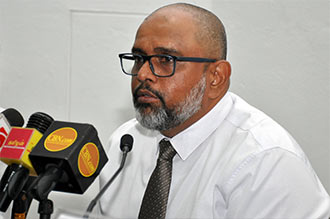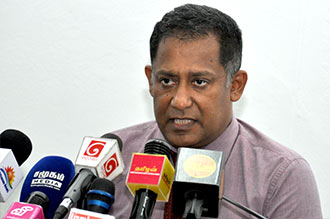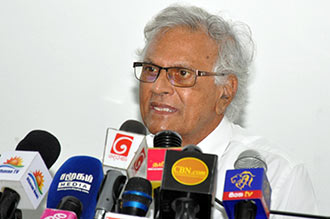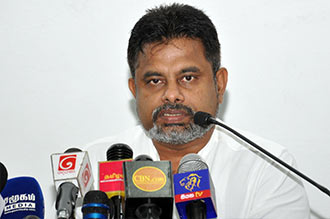Thursday Feb 19, 2026
Thursday Feb 19, 2026
Monday, 30 June 2025 03:56 - - {{hitsCtrl.values.hits}}

Federation of Renewable Energy Developers Association President Thusitha Peiris

NCCSL Renewable Energy Council Member Eng. Prabhath Wickramasinghe

NCCSL Renewable Energy Council Member Eng. Parakrama Jayasinghe

Federation of Renewable Energy Developers Association Treasurer Chamil Silva
By Charumini de Silva
The Federation of Renewable Energy Developers (FRED) last Friday voiced deep concern over the Government’s recent move to slash feed-in tariffs for renewable energy projects, warning that repeated policy reversals risk derailing the country’s clean energy ambitions.
In a direct appeal, the FRED called on President Anura Kumara Disanayake to intervene and guide reforms based on transparent, science-backed principles.
The Federation expressed its ‘profound concern’ about the harmful decisions by the authorities that risk destabilising investment flows, undermining the viability of the sector at a critical time of the country’s energy transition.
Speaking to the media, FRED President Thusitha Peiris described the 30% tariff cut approved by the Cabinet of Ministers on 16 June as a ‘unilateral decision’ that has drained investor confidence.
“The very foundation of sustainable energy development – predictable and fair policy – has been eroded,” he claimed, noting that Sri Lanka cannot hope to meet its 70% renewable energy target by 2030 if it alienates private investors with short-sighted policy reversals.
Peiris called for an immediate review of the tariffs under a proper and independent committee that would consider industry concerns backed by science-based rationale.
National Chamber of Commerce of Sri Lanka (NCCSL) Renewable Energy Council Member Eng. Prabhath Wickramasinghe pointed out that the tariff revision had not been referred to the Public Utilities Commission of Sri Lanka (PUCSL) as legally required.
“If the feed-in tariffs are being changed, they must be approved by the electricity regulator, which has not happened in this case,” he stressed, confirming that the FRED has written to the PUCSL and is awaiting a response.
Eng. Wickramasinghe also criticised the Ceylon Electricity Board (CEB) for delaying the integration of Battery Energy Storage Systems (BESS), despite repeated requests to add at least 1,000 MWh of capacity into the national grid, together with a clear policy framework and the removal of taxes on imported batteries.
He opined that the CEB’s delays in implementing BESS have stifled growth in solar power, leaving developers unable to store daytime generation for use during peak hours.
Peiris expressed frustration at the recent feed-in tariff for BESS without any operational guidelines, describing it as creating confusion in an already uncertain investment environment.
It was pointed out that the taxes on BESS amount to around 50% at import due to a combination of duties, para tariffs, and VAT.
Citing it as a major deterrent and making projects commercially unviable, Peiris explained that unlike in other industries, renewable energy cannot recover VAT on electricity sales, which compounds their financial burden.
“Battery imports, which were once partially tax-exempt, are now taxed at roughly 46% following the end of crisis-era concessions. Because electricity itself is not subject to VAT in Sri Lanka, developers cannot pass the tax on to electricity users and must absorb the entire cost,” he explained. However, in regional export-driven economies like Vietnam and Singapore, battery developers are able to reclaim VAT, helping them remain competitive.
Eng. Wickramasinghe claimed the CEB unilaterally curtailed output from solar power plants since the 9 February countrywide blackout, especially on Sundays and public holidays, citing low demand.
“These curtailments breach long-standing Power Purchase Agreements (PPAs), some dating as far back as 1999, which do not include any clause allowing such cuts,” he stressed, adding that it is illegal.
According to the FRED, the consequences of these have been severe, where 18 Sundays and nine public holidays have seen curtailments wiping out an estimated 14 million units of clean electricity generation and pushing many developers into financial distress.
Eng. Wickramasinghe noted that the tariff assumptions remain unclear, with the CEB citing ‘grid stability’ without publicly sharing any supporting data.
Peiris warned that banks may soon intervene if developers default on their loans, given their inability to meet debt service due to these income losses.
He said around 75% of renewable projects are now operating at marginal profit or outright loss, pointing to the combined effects of the economic crisis, high interest rates, inflation, and delayed payments from the CEB. “Several projects are reportedly close to collapse because of accumulated interest and cash flow shortfalls,” he added.
The FRED Chief also pointed out that the CEB continues to champion a tender-based approach for new power generation projects, despite its dismal track record. “Over the last eight years, the CEB’s tenders for renewable energy projects have consistently failed to achieve their targets,” Peiris claimed.
NCCSL Renewable Energy Council Member Eng. Parakrama Jayasinghe asserted that the Government must oversee the operations of the CEB, warning that a lack of proper monitoring could destabilise the energy sector. He called for urgent reforms to the CEB, insisting on the need to create sufficient financial buffers and lead time for adjustments before Sri Lanka begins debt repayments in 2028, cautioning that delaying action now would stall jeopardising both energy security and economy.
He said that Sri Lanka’s existing 2,000 MW of non-traditional energy sources save up to about $600-700 million foreign exchange.
One of the most contentious issues discussed was the inefficiency in the national grid, which has struggled to accommodate new renewable energy projects.
“We cannot talk about national security without a well-designed, stable grid system. The national grid must be upgraded with new technologies, redundancy, and automation to prevent future cascading failures in the future like we experienced in February,” he said.
Eng. Jayasinghe further noted that Sri Lanka spends over $ 5 billion annually on fossil fuels imports for transportation alone.
“We can reverse this trend by adopting renewable energy. The Middle East became wealthy by selling fossil fuel, but today, the world is shifting to green energy. Sri Lanka must seize this opportunity to expand its renewable energy mix and reduce dependence on fossil fuels,” he added.
FRED Treasurer Chamil Silva reiterated their call for feed-in tariffs to remain the primary policy tool for renewable energy procurement, arguing that competitive tendering had largely failed, while feed-in tariffs successfully added around 1,700 MW of rooftop solar capacity.
He argued the rationale for short tariff periods being offered for battery storage, with the CEB proposing a 10-year arrangement rather than the 20-year framework typically used for PPAs.
The FRED claimed that by including false proposals in the long-term generation plan, the CEB creates an artificial vacuum in the existing supply, which they then attempt to fill through emergency power purchases.